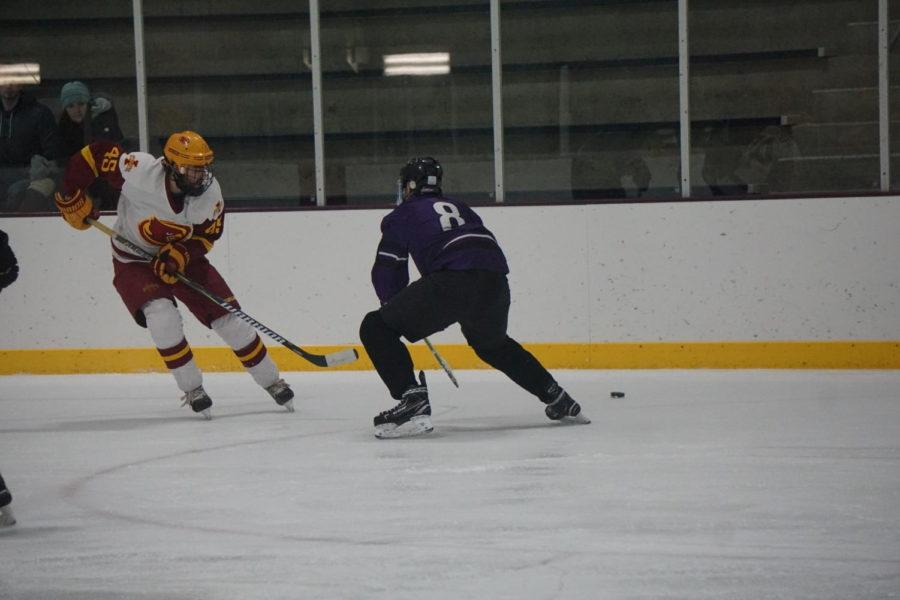Cyclone Hockey prepares to reload, get over runner-up hump
Megan Petzold/Iowa State Daily
Then-freshman Patrick Berges fights for possession of the puck during the Cyclone Hockey versus McKendree University game Nov. 30. The Cyclones lost to the Bearcats 5-2.
September 17, 2019
A changed roster doesn’t mean changed expectations for Cyclone Hockey.
Despite the majority of the goal-scoring players from last year’s team having graduated, there is optimism inside the Cyclones’ locker room that they won’t miss a beat and achieve something which hasn’t happened in 28 years: win a national championship.
Iowa State takes its first steps toward capturing its second American Collegiate Hockey Association title Friday night inside the ISU/Ames Ice Arena against Waldorf.
“The expectation is we compete for a national championship,” said seventh-year head coach Jason Fairman.
Motivation is far from needed.
The Cyclones are the only Division I team to appear in the national title game multiple times in the same decade and lose each time. In 2016 and last season, they saw a 1-0 lead vanish and fall in both games, 2-1.
Dylan Goggin, a returning forward, doesn’t want to feel like that for the second straight campaign.
“We all got together, all the guys coming back, even with the guys that graduated,” Goggin said. “We’re like, ‘this is not going to happen again’ — it’ll drive everybody in practice.”
The slogan that the Cyclones are using this season is “Never Enough.” They don’t view the season as a rebuild, but rather a reload.
Half the roster, filled with players from Fairman’s first recruiting class, are gone. It’ll be replaced with players that have a mixture of speed, grit and discipline.
Those attributes bring excitement for Goggin, a junior and first-year captain.
“Lot of guys who are willing to go into the corners might not be the biggest [guys], but they’re willing to go in there, get dirty,” Goggin said. “I think we have a lot of speed.”
Still, a learning curve is expected from Iowa State as Fairman’s staff implements his system that leans on puck-possession.
“We have some raw talent, but I’m watching what I call their natural game — [it’s] going to be very different than the way we’ve played,” Fairman said. “We may struggle early.”
Maxwell Olson anchors a defense that had the fewest goals against a season ago in conference play. Olson, also a junior, is embracing his leadership role as the assistant captain.
“We’ve been getting all the younger guys on board with systems and culture,” Olson said. “Get them on the same page.”
The schedule, for the fifth straight season, is a difficult one.
Iowa State — with a preseason ranked third by the ACHA — opens Central States Collegiate Hockey League play against Lindenwood — ranked second — that is the beginning a four-game homestead, the longest of the season.
In mid-November, the Cyclones will travel to Minot State to face off against the same Beavers squad that defeated them in the title game in March.
The Cyclones will host Missouri State, Jamestown, Oklahoma and Northern Illinois while traveling to Alabama and Colorado State as part of the non-conference slate. They’ll visit Waldorf Saturday after hosting the season opener Friday night.
On the preseason rankings that came out Thursday, 11 of Iowa State’s opponents are ranked in the top-25.
“The teams we’ll be playing are going to be good,” Fairman said.
Iowa State is accustomed to getting out to fast starts. It began 12-3-1 last year before dropping six in a row and eight of nine.
If the losing streak happens earlier this time around, the panic button won’t be pressed.
“Missouri [State] will be a wake up call for a lot of guys,” Olson said. “Depending on if guys step up, we might have to play tighter defense and button a lot of things down. It’ll be a battle.”
Fairman’s hope is his team is playing their best hockey at the tail end of the season, when the games reach a higher level of magnitude.
“It’s the challenge of taking some young, raw talent and [seeing] if we can mold that into the type of program we’ve become,” Fairman said. “We got our work cut out.”
















